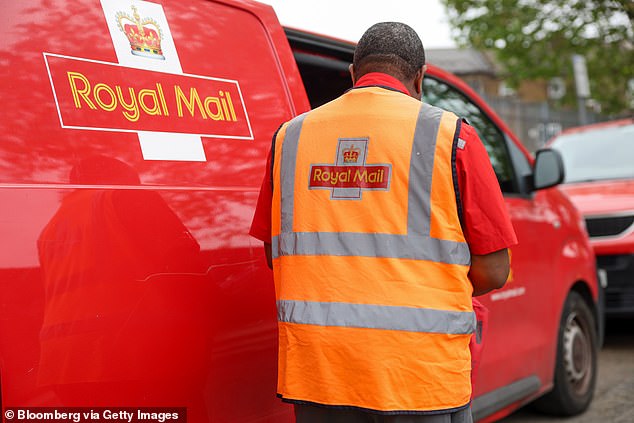Labour’s greatest business betrayal has been accomplished without words of public dissent.
Assured by undertakings from Czech sphinx Daniel Kretinsky, 80 per cent of shareholders voted in favour of his EP Group’s £3.6billion purchase of
Royal Mail owner International Distribution Services (IDS).
Sell-out merchant Keith Williams, IDS chairman, hailed the deal. He claims it will preserve ‘the unique heritage’ of the Royal Mail and asserted that ‘legally binding undertakings’ have been endorsed by the Government.
Those undertakings are certain to be challenged by economic events. The Royal Mail will now be loaded with £3billion of debt (in addition to £2billion on its books) in a world haunted by Trumpian uncertainty.

Last post: After its sale to Czech billionaire Daniel Kretinsky the Royal Mail will now be loaded down with £3bn of extra debt (in addition to £2bn already on its books)
Read across from Britain’s venerated postal delivery service to the financial vandalism at our water companies.
Privatised with no debt on their balance sheets, the National Audit Office, in a newly released report, found that uncaring, financially-driven overseas ownership resulted in £70billion of debt being loaded on.
Some ten of the 16 companies are not earning enough to cover their interest rate bill, let alone deal with the sewage.
How on earth Business Secretary Jonathan Reynolds allowed himself to be convinced that Royal Mail could satisfy the pay and job demands of the unions, invest in improving the service and meet horrendous borrowing costs all at the same time, is impossible to know.
Behind the scenes, the Postal Workers Rank-and-File Committee was fighting back against Kretinsky before the votes had been counted. It fears a trial of a new ‘optimised delivery model’ will gut the roles of the postie and Parcelforce.
Disgracefully, the big winners from the deal will be senior executives, who connived in the disposal, and City bankers and advisers, set to collect £145million in fat fees.
These funds could have been spent on improving services to the public. It is a case of Labour combined with a grasping billionaire against the public interest.
Trading blows
The biggest question for markets post Liberation Day is: Will Donald Trump’s tariff war bring America’s robust economy to a shuddering halt?
We have half an answer. The US economy recorded a 0.3 per cent annualised downturn in the first quarter, which roughly coincided with the President’s first 100 days.
But the data is distorted by businesses taking prophylactic action by stepping up imports by 41.3 per cent to minimise a tariff hit.
The more relevant data is consumer spending, which accounts for some two-thirds of total US output. It climbed by 1.8 per cent in the first quarter and is holding up.
As import levies bite, it is unlikely that British marques Aston Martin or Jaguar will be attracting buyers any time soon.
Aston Martin is limiting exports until there is clarity on the 25 per cent Trump charge. Jaguar Land Rover is doing the same.
Making deals is still on the Trump agenda. By all accounts, India’s strongman prime minister Narendra Modi will be the first to win a wide-ranging free trade deal with the US.
That is not an outcome which Sir Keir Starmer and Rachel Reeves, with the belief they were at the head of the line, will have hoped for.
Reeves did not help Britain’s prospects with loose lips in Washington last week when she talked of an EU deal being as important, if not more so, than an American agreement, and of a willingness to work with China.
Trump’s trade overseer Howard Lutnick aims to sign 90 trade accords by the time the 90-day freeze on bullying reciprocal tariffs comes to an end.
That’s a big ask even for a White House enthused by the art of the deal.
Heathrow hell
Britain too rarely puts its best foot forward on air travel. On my recent trip to the IMF in Washington DC, the BA flight to the US capital inevitably was delayed.
Coming back from Austin, Texas there was another hefty wait. All was made worse when the flight arrived at Heathrow.
No available landing slots meant some 20 minutes of circling. After the plane landed, there was a ten-minute delay for steps to arrive, followed by a charabanc ride on a crowded bus with no air-conditioning around Heathrow’s grim byways before disembarking at Terminal 5.
Not a terrific demonstration of Britain open for business!
DIY INVESTING PLATFORMS

AJ Bell

AJ Bell
Easy investing and ready-made portfolios

Hargreaves Lansdown

Hargreaves Lansdown
Free fund dealing and investment ideas

interactive investor

interactive investor
Flat-fee investing from £4.99 per month

InvestEngine

InvestEngine
Account and trading fee-free ETF investing
Trading 212
Trading 212
Free share dealing and no account fee
Affiliate links: If you take out a product This is Money may earn a commission. These deals are chosen by our editorial team, as we think they are worth highlighting. This does not affect our editorial independence.
This article was originally published by a www.dailymail.co.uk . Read the Original article here. .

